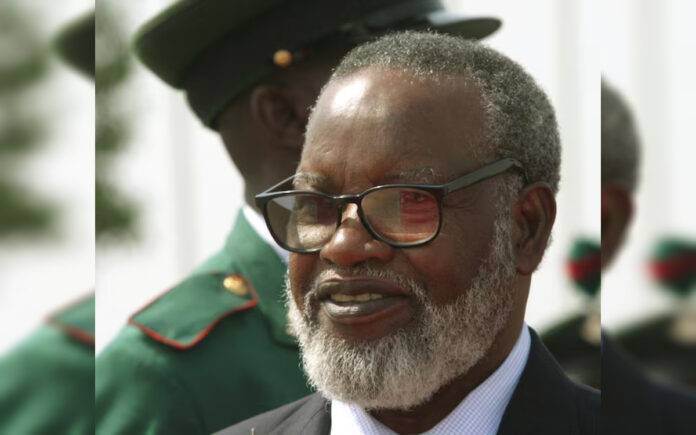Windhoek: Sam Nujoma, the revolutionary leader and Namibia’s first democratically elected president, has died at the age of 95, the Namibian Presidency announced on Sunday.
Nujoma, a pivotal figure in Namibia’s struggle for independence from apartheid South Africa, led the country from 1990 to 2005 and was officially recognized as the “Founding Father of the Namibian Nation” by a 2005 act of parliament.
A Legacy of Leadership and Controversy
Nujoma’s presidency was marked by nation-building efforts, but also drew domestic and international criticism. He was known for his staunch intolerance of critical media, opposition to homosexuality, and a 1998 constitutional amendment that enabled him to serve a third term.
A close ally of Zimbabwe’s Robert Mugabe, Nujoma supported land seizures from white farmers in Zimbabwe but adopted a “willing buyer, willing seller” land reform policy at home.
“The foundations of the Republic of Namibia have been shaken,” the Namibian Presidency posted on X, describing Nujoma as a leader who “blazed the trail to freedom” and inspired the nation.
and revolutionary leader, H.E. Dr. Sam Shafiishuna Nujoma.” @DrNangoloMbumba President Nujoma passed on at the age of 95 on the 8th of February at 23h45 in Windhoek, Namibia. Read full statement: https://t.co/Aw4VpZp4Y4
— Namibian Presidency (@NamPresidency) February 9, 2025
The presidency confirmed that Nujoma had been hospitalized for three weeks before succumbing to his illness.
Building a Nation from Struggle
Ruling for 15 years, Nujoma sought to present himself as a unifying leader in a country still grappling with the legacy of apartheid and German colonial rule. Under his leadership, SWAPO promoted a national reconciliation program under the slogan “One Namibia, One Nation.”
Nujoma frequently reiterated in his speeches: “A united people, striving to achieve a common good for all members of society, will always emerge victorious.”
His leadership was credited with establishing democratic institutions and fostering stability. However, analysts highlight his authoritarian tendencies, particularly his suppression of the 1999 Caprivi rebellion and crackdown on opposition media.
Also Read | New Zealand Overhauls Investor Visa Scheme to Lure Global Capital
“While Nujoma’s presidency was foundational in establishing Namibia’s independence and governance, it was not without flaws,” said political analyst Ndumba Kamwanyah of the University of Namibia.
From Activist to Freedom Fighter
Born in 1929 in northwestern Namibia, Nujoma grew up herding cattle before attending a Finnish mission school. He later worked for South African Railways in Windhoek before dedicating himself to anti-apartheid resistance.
In the late 1950s, he led the Owambo People’s Organisation, a precursor to SWAPO, organizing protests against forced Black relocations. Following police killings of protesters, Nujoma was charged and arrested before going into exile in 1960.
Also Read | Thailand Welcomes Back Five Citizens Held by Hamas for 15 Months
During his exile, he lobbied for Namibia’s independence, traveling across Africa and to the United Nations in the U.S.. He was named SWAPO leader in absentia and in 1966 launched a guerrilla war against South African rule.
After decades of struggle, a 1978 U.N. Security Council resolution paved the way for elections. In 1989, SWAPO won a majority, and Nujoma took office on March 21, 1990, as Namibia’s first president.



